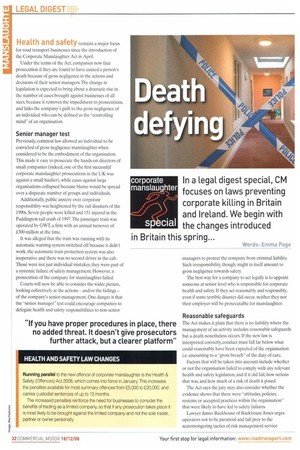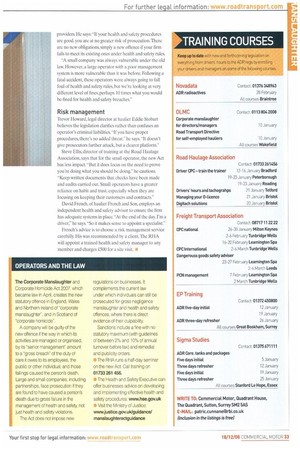Health and safety remains a major focus for road transport
Page 32

Page 33

If you've noticed an error in this article please click here to report it so we can fix it.
businesses since the introduction of the Corporate Manslaughter Act in April.
Under the terms of the Act, companies now face prosecution if they are found to have caused a person's death because of gross negligence in the actions and decisions of their senior managers. The change in legislation is expected to bring about a dramatic rise in the number of cases brought against businesses of all sizes, because it removes the impediment to prosecutions, and links the company's guilt to the gross negligence of an individual who can be defined as the "controlling mind" of an organisation.
Senior manager test
Previously, common law allowed an individual to be convicted of gross negligence manslaughter when considered to be the embodiment of the organisation. This made it easy to prosecute the hands-on directors of small companies (indeed, one of the first successful corporate manslaughter prosecutions in the UK was against a small haulier), while cases against large organisations collapsed because blame would be spread over a disparate number of groups and individuals.
Additionally, public anxiety over corporate responsibility was heightened by the rail disasters of the 1990s. Seven people were killed and 151 injured in the Paddington rail crash of 1997. The passenger train was operated by GWT, a firm with an annual turnover of £300 million at the time.
It was alleged that the train was running with its automatic warning system switched off because it didn't work, the automatic train protection system was also inoperative and there was no second driver in the cab. Those were not just individual mistakes, they were part of a systemic failure of safety management. However, a prosecution of the company for manslaughter failed.
Courts will now be able to consider the wider picture, looking collectively at the actions — and/or the failings — of the company's senior management. One danger is that the "senior manager" test could encourage companies to delegate health and safety responsibilities to non-senior managers to protect the company from criminal liability. Such irresponsibility, though, might in itself amount to gross negligence towards safety.
The best way for a company to act legally is to appoint someone at senior level who is responsible for corporate health and safety If they act reasonably and responsibly, even if some terrible disaster did occur, neither they nor their employer will be prosecutable for manslaughter.
Reasonable safeguards
The Act makes it plain that there is no liability where the management of an activity includes reasonable safeguards but a death nonetheless occurs. If the new law is interpreted correctly, conduct must fall far below what could reasonably have been expected of the organisation i.e. amounting to a "gross breach" of the duty of care.
Factors that will be taken into account include whether or not the organisation failed to comply with any relevant health and safety legislation, and if it did fail, how serious that was, and how much of a risk of death it posed.
The Act says the jury may also consider whether the evidence shows that there were "attitudes, policies, systems or accepted practices within the organisation" that were likely to have led to safety failures.
Lawyer James Backhouse of Backhouse Jones urges operators not to be paranoid and fall prey to the scaremongering tactics of risk management service providers. He says: "If your health and safety procedures are good, you are at no greater risk of prosecution. There are no new obligations, simply a new offence if your firm fails to meet its existing ones under health and safety rules.
"A small company was always vulnerable under the old law. However, a large operator with a poor management system is more vulnerable than it was before. Following a fatal accident, these operators were always going to fall foul of health and safety rules, but we're looking at very different level of fines, perhaps 10 times what you would be fined for health and safety breaches."
Risk management Trevor Howard, legal director at haulier Eddie Stobart believes the legislation clarifies rather than confuses an operator's criminal liabilities. "If you have proper procedures, there's no added threat.he says. "It doesn't give prosecutors further attack, but a clearer platform."
Steve Ellis, director of training at the Road Haulage Association, says that for the small operator, the new Act has less impact. "But it does focus on the need to prove you're doing what you should be doing." he cautions. "Keep written documents that checks have been made and audits carried out. Small operators have a greater reliance on habit and trust, especially when they are focusing on keeping their customers and contracts.
David French, of haulier French and Son, employs an independent health and safety advisor to ensure the fuin has adequate systems in place. -At the end of the day. I'm a driver," he says. "So it makes sense to appoint a specialist."
French's advice is to choose a risk management service carefully. Ills was recommended by a client. The RHA will appoint a trained health and safety manager to any member and charges £500 for a site visit. el




































































































































































